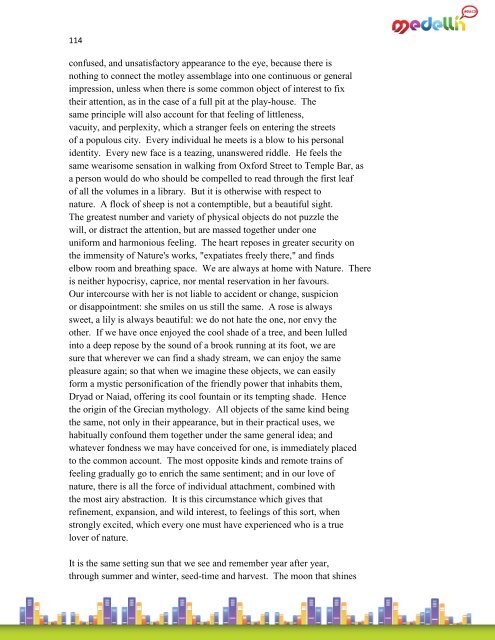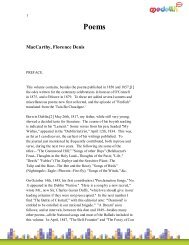Lectures On The English Poets William Hazlitt
Lectures On The English Poets William Hazlitt
Lectures On The English Poets William Hazlitt
You also want an ePaper? Increase the reach of your titles
YUMPU automatically turns print PDFs into web optimized ePapers that Google loves.
114<br />
confused, and unsatisfactory appearance to the eye, because there is<br />
nothing to connect the motley assemblage into one continuous or general<br />
impression, unless when there is some common object of interest to fix<br />
their attention, as in the case of a full pit at the play-house. <strong>The</strong><br />
same principle will also account for that feeling of littleness,<br />
vacuity, and perplexity, which a stranger feels on entering the streets<br />
of a populous city. Every individual he meets is a blow to his personal<br />
identity. Every new face is a teazing, unanswered riddle. He feels the<br />
same wearisome sensation in walking from Oxford Street to Temple Bar, as<br />
a person would do who should be compelled to read through the first leaf<br />
of all the volumes in a library. But it is otherwise with respect to<br />
nature. A flock of sheep is not a contemptible, but a beautiful sight.<br />
<strong>The</strong> greatest number and variety of physical objects do not puzzle the<br />
will, or distract the attention, but are massed together under one<br />
uniform and harmonious feeling. <strong>The</strong> heart reposes in greater security on<br />
the immensity of Nature's works, "expatiates freely there," and finds<br />
elbow room and breathing space. We are always at home with Nature. <strong>The</strong>re<br />
is neither hypocrisy, caprice, nor mental reservation in her favours.<br />
Our intercourse with her is not liable to accident or change, suspicion<br />
or disappointment: she smiles on us still the same. A rose is always<br />
sweet, a lily is always beautiful: we do not hate the one, nor envy the<br />
other. If we have once enjoyed the cool shade of a tree, and been lulled<br />
into a deep repose by the sound of a brook running at its foot, we are<br />
sure that wherever we can find a shady stream, we can enjoy the same<br />
pleasure again; so that when we imagine these objects, we can easily<br />
form a mystic personification of the friendly power that inhabits them,<br />
Dryad or Naiad, offering its cool fountain or its tempting shade. Hence<br />
the origin of the Grecian mythology. All objects of the same kind being<br />
the same, not only in their appearance, but in their practical uses, we<br />
habitually confound them together under the same general idea; and<br />
whatever fondness we may have conceived for one, is immediately placed<br />
to the common account. <strong>The</strong> most opposite kinds and remote trains of<br />
feeling gradually go to enrich the same sentiment; and in our love of<br />
nature, there is all the force of individual attachment, combined with<br />
the most airy abstraction. It is this circumstance which gives that<br />
refinement, expansion, and wild interest, to feelings of this sort, when<br />
strongly excited, which every one must have experienced who is a true<br />
lover of nature.<br />
It is the same setting sun that we see and remember year after year,<br />
through summer and winter, seed-time and harvest. <strong>The</strong> moon that shines

















